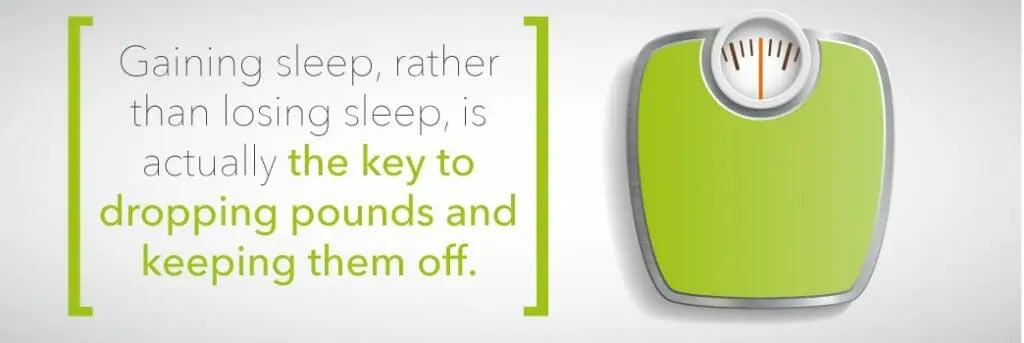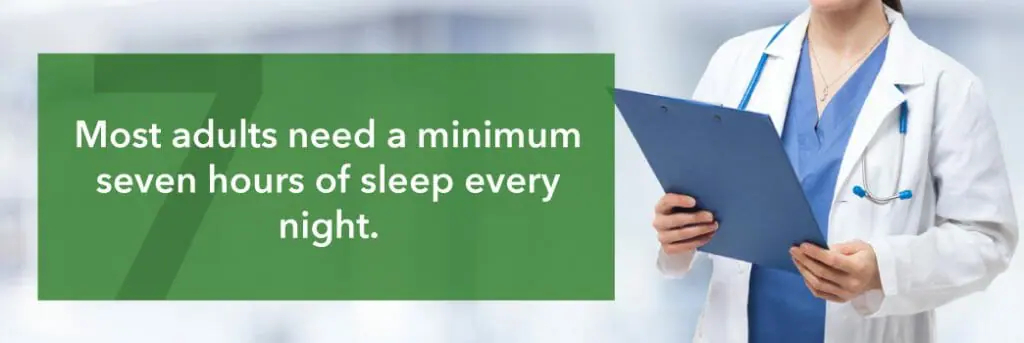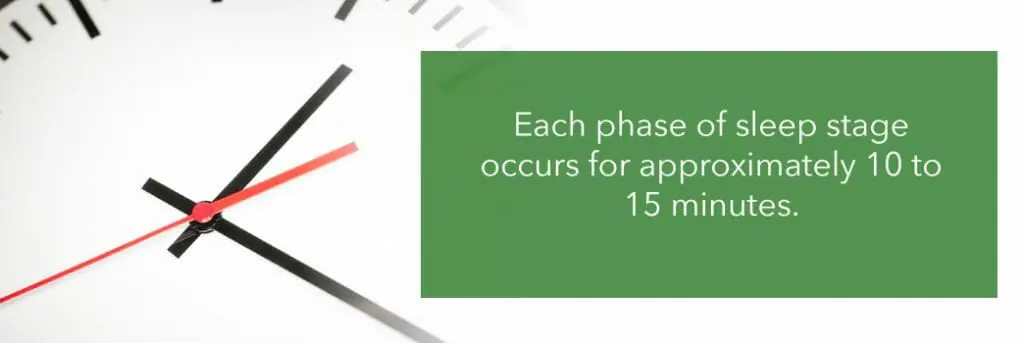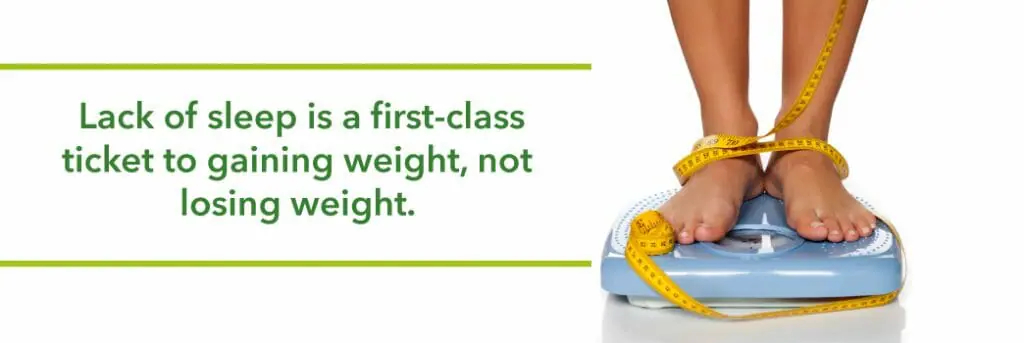
If you’re like the vast majority of people, losing weight is a lot harder than losing sleep. There are hundreds, perhaps thousands, of weight loss programs available today, but there’s very little out there focusing on the effect that proper sleep has on your overall health, including losing weight and maintaining a healthy body size.
Most weight loss strategies are aimed at helping you reduce excess pounds and keep those pounds off. But, a strategy focused on improving sleep first to shed unwanted pounds? Who’s ever heard of that novel approach? Could a good night’s sleep be the real magic in setting a dependable foundation for a weight loss program that works once and for all?
Many weight loss programs are based on developing a special diet, tailored specifically for you. They offer a formula for limiting your caloric intake and increasing your rate of calorie burn. It’s tied to your optimum body mass index, or BMI, and it targets that balance as your optimum weight-to-size ratio. Credible weight loss programs should take into account your age, genetic factors and a lot of your lifestyle specifics. This approach reflects who you are as a unique individual and pinpoints what really is the healthiest number on the bathroom scale.

Most discussions about weight loss seem to revolve around the combination of eating and moving. The standard view seems to be that if you want to lose weight and look better, the answer is to eat less fattening foods and exercise more to burn the excess fat off.
The reality of the “move more, eat less” advice is not that accurate, though. It’s not based on the entire scientific picture, and it’s missing a critical component — sleep. If you’ve ever thought “can sleep help weight loss?”, then read on to learn more about the relationship between the two.

The Relationship Between Sleep and Weight Loss
As well meaning as most weight loss programs are, often they overlook the sleep and weight loss relationship. Sleep is as natural to maintaining a healthy body as consuming the proper volume of nutritious food and getting the right amount of daily exercise.
It’s all about achieving a balance in lifestyle. Sleep and weight loss research conclusively prove that getting the proper amount of sleep — and quality of sleep — is the single most important step you can take in reducing your weight and maintaining a steady body mass index. Think of weight loss as a three-part equation or a triangle with each slope equally balanced. The formula is proper diet, plus proper exercise, plus proper sleep, equals proper weight, and, therefore, it’s the best balance to achieving good health you can find.
What this means is that gaining sleep, rather than losing sleep, is actually the key to dropping pounds and keeping them off. To many, this may sound like it’s too simple to be true.

But if you’re asking “does sleep promote weight loss?” bear in mind it’s no secret that proper sleep and weight loss go hand-in-hand. The correlation of sleep and weight loss is one of the most basic fundamentals of an effective, workable and long-lasting weight loss program that will naturally and permanently reduce your weight and keep it at the level where you’re truly comfortable.
So, if it’s so easy to just sleep away the pounds, then why isn’t everyone doing it? Why isn’t that the core of all weight loss programs, regardless of who offers them and how much they cost?
Well, that’s not the easiest to convincingly answer because most people are far too busy, stressed out and time-strapped to take the time necessary to investigate sleep and weight loss facts, let alone put them into practice.
Convincing yourself that the sleep truly does help weight loss starts with understanding how sleep affects the human body. From there you’ll see the sleep and weight loss relationship. Perhaps then, aiming for the right amount of sleep will be a real eye-opener in the battle of the bulge.
How Sleep Affects the Human Body
Now that we’ve answered the question “does sleep help with losing weight?”, you may still be wondering exactly how does getting sleep help you lose weight? When you think of getting a good, restful night’s sleep you probably envision seven to nine hours of continuous “out like a log,” unbroken shut-eye with nothing going on except for the occasional toss and turn.

You’re right about the time-frame but wrong on the subconscious activity that your brain and body parts are going through. Virtually all physicians and sleep specialists agree that most adults need a minimum seven hours of sleep every night. There are differing opinions in the maximum amount of sleep, just as there are huge differences in each person’s individual physiological and psychological body compositions.
REM and Non-REM Sleep
Sleep analysists have long known about the importance of rapid eye movement or REM sleep, during the body’s resting period. Naturally, the body cycles through non-REM and REM sleep where the eyes are moving rapidly from side to side. This is a natural phenomenon and is part of the sleep process that works to rest the body’s muscles and organs while revitalizing the brain.

There are three phases of sleep prior to each REM period. Each stage occurs for approximately 10 to 15 minutes, and your body cycles through each stage before entering a REM-sleep period:
- Stage 1: Your eyes are closed, but you’re in light sleep and are easy to wake.
- Stage 2: When you’re in light sleep, your heart rate begins to slow, and your core temperature starts to drop. Here your body is preparing for deep sleep.
- Stage 3: You’re in a deep and restful sleep. At this point, you’re hard to wake and if woken, you would feel disorientated and confused for a few minutes until your brain reactivates.
It’s during the deep stages of non-REM sleep where your body’s growth and repair activities occur, including building muscle and bone as well as strengthening your immune system. There is minimal brain activity or neuromuscular response to stimuli. Once the first period of non-REM sleep is finished, your brain begins to become semiconsciously alert, and your eyes begin the rapid, side-to-side movement called REM sleep. Your eyelids are shut and you’re oblivious to outside influences, but you’re far from inactive. REM sleep is when your dreams take place.
A typical night starts by falling asleep with a non-REM pattern of about one-half to a maximum of one hour, How REM Sleep Improves Health
The natural pattern of non-REM sleep followed by varying lengths of REM-filled sleep is essential for your body to properly rest. It allows your many systems to go through their requirements of contributing to your overall health. This includes controlling your optimum weight or contributing to your planned weight loss.
When your body is used to a natural or circadian rhythm of healthy REM and non-REM sleep filling the entire sleep period, you wake feeling rested and invigorated. Short-change that time requirement, and you’re going to feel groggy, low on energy and often hungry. Your brain is not operating at peak capacity, and it’s a lot like being drunk.
Sleep deprivation is a serious matter, not just for regulating body weight, but also for putting your brain operation into a risky situation. Proper sleep is vitally important to how your brain’s frontal lobe is able to process decision making and impulse control. Much like being impaired by alcohol or other thought-numbing substances, a lack of properly balanced REM and non-REM sleep is vital to rational thought processes, whether they be conscious motions or involuntary cravings like the unnecessary need for fatty foods or the lack of energy and willpower to carry out regular exercising.
When your brain’s frontal cortex is impaired from a lack of sleep, it’s far more receptive or perhaps less resistant to stimulants that suggest an alternative way to pick up energy and alertness. Often, this is the craving for and response to desiring high-fat, high-carbohydrate and high-sugar foods. On the reverse, your brain and muscular system is far less receptive to engaging in vigorous activities.

In conjunction, the sleep-deprived desire for extra calories and the dog-tired aversion to burning calories leads to an imbalance in the food-exercise-sleep triangle. Lack of sleep is a first-class ticket to gaining weight, not losing weight, and it’s a pattern of continual sleep deprivation that’s one of the worst offenders in the struggle to lose weight.
What’s the actual number of hours that sets the sleep deprivation bar, you’re wondering? It really depends on the individual’s metabolism and at what point they appear metabolically groggy. Since the body works its best on eight hours of sleep, anything below that can make the task of weight loss difficult.
This may seem hard and fast, but there’s more going on through your body in the sleep and weight loss relationship than just what’s in your brain. Your digestive system is extremely affected by a lack of sleep, and your digestive tract is a vital part of your overall bodily functions that creates proper weight control or forms the anchor to your weight loss program.
How Sleep Affects Body Weight
Do you think willpower alone is a sufficient force to combat excessive weight? Have you heard of weight loss programs where they promote mind-control to will away the pounds and prevent them from coming back? Of course you have, and, truthfully, there’s something to it.
The real willpower force in weight loss is a sort of metaphysical focus where you willfully put yourself in a relaxed, subconscious state. You intentionally enter this state on a daily basis and, given the proper time duration, natural and systematic forces in your body take over and regulate your weight through a highly-complex, conversion process of food to energy. This metaphysical state is 100 percent natural, and it’s called sleep.
Sleep is the wildcard in the weight loss deck. Unfortunately, few people know just how important the sleep card is, nor do many know how it’s properly played. For a great part, your brain is controlled by signals your stomach and digestive system is sending it.
You know when your stomach says it’s hungry, and you know when the rest of your body says it’s tired. You also know when you feel heavy, and you recognize it when you look in the mirror. But what you probably don’t know is how this physically happens and how this ties into sleep and loss of weight.
As nice as it would seem, no amount of willpower can control your stomach’s natural feeling of hunger. Hunger is triggered by two natural hormones termed ghrelin and leptin. These are the culprits that tell the brain it’s time to eat, or it’s time to stop eating. Additionally, just as hunger is primarily controlled by ghrelin and leptin, these natural hormones are greatly affected by sleep — or worse — a lack of sleep.

Adipocytes in your body’s fat cells are responsible for releasing leptin hormones into your bloodstream that are meant to signal there are sufficient fat stores to carry the body at its current metabolic rate of energy consumption. Leptin acts as a natural suppressor for your appetite. On the other hand, when your stomach is empty or nearly empty, ghrelin is released in your bloodstream that automatically signals your brain it’s time to eat again.
A serious side effect of sleep deprivation is that leptin levels are artificially lowered, and ghrelin levels are artificially raised. It’s a double hit of hormones your body receives, and it results in powerful signals that more food is required than is actually necessary. Your body responds with an unnatural hunger craving that can’t easily be controlled by your brain.
Compounding this false hunger alert that’s attributed to your half-asleep brain is a rise in orexin levels in your hypothalamus which is the center of the brain that interacts with sleep and appetite. Your lack of sleep causes an imbalance in orexin and a further imbalance of hormone production in ghrelin and leptin.
This imbalance plays havoc with your body’s natural circadian sleep cycles and confuses the body-brain interaction of how much energy is available. These competing systems and cycles amplify your feeling of daytime drowsiness and low energy level. This sends your body into a type of survival mode where it works to conserve existing fat stores that are exactly the excess weight you may be trying to get rid of.
This isn’t the end of the sleep-deprived spin-cycle your body is experiencing. The imbalance of leptin-ghrelin-orexin creates a spike in cortisol, and this is also amplified on its own by having too little sleep. Cortisol is a stress hormone that signals your body to conserve even more energy to supply a perceived lack during waking hours. Adding to a rush of cortisol is a release of serotonin that helps to keep you awake but does nothing whatsoever to help with weight loss.
Any discussion of the metabolic upset that happens due to a continual loss of sleep is incomplete without mentioning insulin. Insulin is your body’s master storage hormone, and it works to regulate blood sugar and the transfer of glucose into energy. With your pancreas producing insulin properly, fatty acids and lipids are removed from the bloodstream, and proper regulation and storage are achieved. A tired body and a suppressed hormonal system causes irregularities in insulin production and leads to more fat storage than necessary. This is why many diabetes sufferers are obese and chronically tired.
The Relationship Between Sleep Deprivation and Weight Gain
The entire imbalance of leptin, ghrelin, insulin, orexin, serotonin and cortisol can be attributed directly to a lack of decent sleep that’s manifested in a feeling of being continually tired and hungry. There’s no doubt a lack of sleep is responsible for an inability for you to lose weight and there are two main reasons: The metabolic aspect is what’s just been described. Then there’s the behavioral aspect.
A lack of rational decision-making caused by a poorly-functioning and exhausted cerebral cortex is made worse by a stimulated amygdala, which is the reward center of your brain. When you make the choice to eat more and exercise less — a choice prejudiced by a lack of sleep — your brain rewards you with a full feeling, especially when you eat foods that are high in fat, sugar and carbohydrates.
Not only do you unnecessarily eat the wrong and unhealthy types of foods when you’re tired, but you’ll eat more of them to fulfill a false sense of hunger. These same foods are high in energy and go one-step further in tricking your body into believing that a boost of energy has arrived. Subconsciously, that’s just enough for a false sense of security that says maybe you’re getting enough sleep to get by. You may feel fine in the short-term, but it’s doing nothing to wear down that supply of extra weight you’ve been trying to eliminate.
It’s all a vicious cycle. Insufficient sleep causes you to be constantly hungry. You reach for more and larger portions, and because you’re excessively tired, you lack the thought process to make a conscious decision to cut down on food or simply go to bed earlier and do so on a regular basis.

Without question, the sleep and weight loss relationship is real, and it’s something you can act upon now. It takes willpower to get into a routine of claiming a good eight hours of sleep per night and starting an effective program in shedding those pounds.
Workable Tips for Falling Asleep and Losing Weight
But sometimes willpower just isn’t enough, and you need some help to get into a habit.
The number one factor in getting a night of restful sleep is destressing before bedtime. Far too many people lay down to sleep with their head spinning from life-stressors, amplified by a combination of high sugar levels and hormone imbalance. Destressing means different things to different people but, generally, it means adjusting your lifestyle to a relaxing level.

If you’re wondering what are tips for good sleep, know that there are plenty of small things you can do to improve the quality of your rest. To de-stress effectively, get better sleep and lose weight, be sure you:
- Set a schedule. Make sure you have eight hours set aside for sleep every day, not just on weekends and holidays.
- Set a bedtime ritual. This is not the time to worry about the next day or days out. Accept that it’s the end of this day and have a hot bath or another relaxing luxury.
- Shut off electronic devices. That includes the television, laptop and smartphone. The information bombardment and visual light from your device screens are distracting and overly stimulating.
- Do not eat high-calorie foods within several hours of bedtime. Once you’re in a routine, the night-time cravings will stop.
- Avoid stimulants like alcohol and caffeine within four hours of bedtime. Contrary to belief, these are not relaxants or stimulants that contribute to decent sleep.
- Turn out the lights. Humans are naturally programmed to sleep when dark and wake when light. This is hard-wired into our circadian rhythms, and it affects our production of serotonin and melatonin. Block out as much light from your bedroom as possible using heavy drapes. If necessary, purchase a sunrise alarm clock that will replicate soft morning light in your bedroom when i
t’s time to wake up.
If you’re having trouble losing weight, it may be because of difficulty organizing your time to get a proper night’s rest. Contact Synergy Wellness to discuss what weight loss solutions will work for you. Our team of highly trained and extremely motivated professionals is ready to help you find your health, happiness and your key to successful weight loss.



